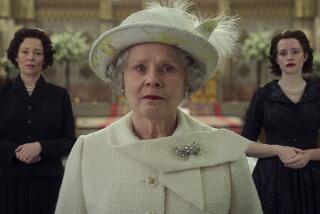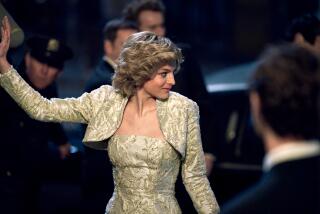Diana’s Death Gives Life to Ethics Debate
- Share via
LONDON — For the nation she held in thrall through public glamour and private misery, Princess Diana is proving as magnetic and vexatious in death as she did in life.
In the predictable aftermath of CDs, T-shirts and Diana teacups, there is also the spectacle of British newspapers publicly wrestling with their consciences--and one another--about the hounding of public figures.
The publisher of a Diana-tells-all book, meanwhile, is fending off angry criticism that ranges from her family to Buckingham Palace to charities that won’t take his money.
Can Diana The Movie be far behind? It’s not.
If the national outpouring after her death in a car crash Aug. 31 was the expression of the touchy-feely “new Britain” of which Diana was such a powerful symbol, the old-fashioned issues of principle and ethics now headline the post-mortem debate.
“Since that dreadful night in Paris, old orthodoxies are being challenged right across the spectrum. Institutions are being engaged in reexamination. Values are being scrutinized,” said John Wakeham, a former government minister who heads Britain’s Press Complaints Commission.
With paparazzi being investigated in France in Diana’s death, Wakeham is demanding urgent updating of British journalism’s Code of Practice.
Stiffer rules of professional conduct, agreed to by editors of major British newspapers, should be ready next month.
The editors have already pledged not to buy paparazzi pictures impinging on an individual’s privacy and vowed to respect the privacy of Diana’s teenage sons, Princes William and Harry. The boys are back at boarding school, so far undisturbed by photographers.
If there is both broad and specific agreement among editors to curtail excesses, there is also dissension.
David English, the editor in chief of the Daily Mail, chairs the committee working on the update of the Code of Practice, and his paper was one of the princess’s favorites. It was also a big paparazzi market. Conrad Black, chairman of the establishment Daily Telegraph, was heard complaining that having English as the committee chairman is akin to asking Al Capone to investigate crime in 1920s Chicago.
This week, Australian American press baron Rupert Murdoch told reporters in Australia that the main problem with paparazzi pictures in his London tabloids the Sun and the News of the World is that editors pay too much for them.
“I think you will see a great deal more restraint by all the newspapers in Britain, and I think you’ll see a stronger and better policed code of ethics,” Murdoch said, adding, “It would be a major cost-saving if we can see this through.”
The Daily Telegraph opined in an editorial: “Mr. Murdoch’s comments are not just deeply offensive but also profoundly depressing. Here is a man who owns a large slice of the British national press, yet a tragedy that has ravaged the nation leaves him cold.”
It did not leave Andrew Morton cold. In 1992, he wrote a bestseller biography of Diana that made him a millionaire. A former tabloid royals reporter, Morton quoted unnamed sources for insider reports of Diana’s loveless marriage, her bulimia and her desperate unhappiness with a husband who mocked his wife and adored his lover.
After her death, Morton disclosed that the secret source was Diana herself.
“To all intents and purposes, it was her autobiography, the personal testament of a woman who saw herself at the time as voiceless and powerless,” Morton said.
Diana’s words were recorded by an intermediary who asked her Morton’s questions.
A hurriedly revised edition of the book published this month, “Diana: Her True Story in Her Own Words,” contains an 18,000-word excerpt from the tapes. There are two new concluding chapters, one on Diana’s love affair with Egyptian Dodi Fayed, with whom she died, and one on her funeral.
Buckingham Palace lamented the book, calling its publication “particularly sad, coming as it does soon after the princess’s death.”
Morton is under less euphemistic attack from critics who charge that greed more than history underpinned the revised edition. Tabloids that once stalked the hapless princess from motorbikes and speedboats now self-righteously flog Morton. “Diana, The Final Insult,” the Express said.
Michael O’Mara, the book’s publisher, said that he and Morton will make a “substantial contribution” in Diana’s honor to an anti-land-mine charity from proceeds of the $25 hardback. The book’s dust jacket says “a donation has been made,” but charities have rejected the money.
The British Red Cross said that “being associated with this book would not be appropriate.”
A director of Halo Trust, which organized Diana’s anti-land-mine visit to Angola, said “hell would freeze over before we accepted a penny.”
Two other British anti-land-mine groups also declined.
After the words, the pictures. Producer Martin Poll’s four-hour 1993 TV miniseries from Morton’s original book drew record audiences to Murdoch’s Sky television satellite network.
Now, Poll said, a feature film will update Diana’s life to its tragic end.
Poll has the right to Morton’s book, publisher O’Mara said, but may not use the transcripts or the tapes from which they were taken.
More to Read
Sign up for Essential California
The most important California stories and recommendations in your inbox every morning.
You may occasionally receive promotional content from the Los Angeles Times.













